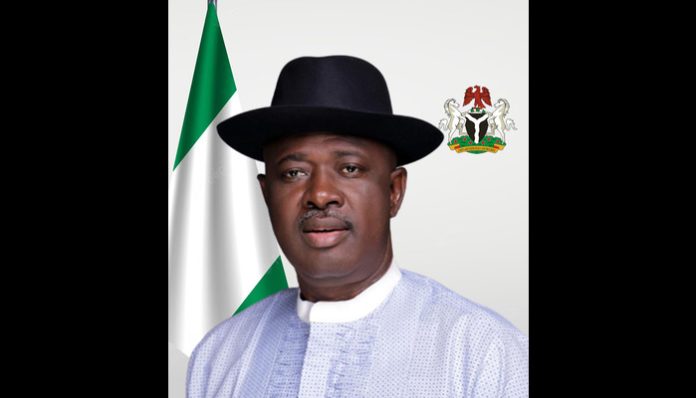The Minister of State for Petroleum Resources (Oil), Heineken Lokpobiri, has expressed concerns over the underperformance of Nigeria’s upstream oil sector, warning that it poses a major threat to the sustainability of the nation’s oil and gas industry.
Speaking at the 8th Nigeria International Energy Summit (NIES 2025) in Abuja, Lokpobiri emphasized that the success of the entire petroleum value chain—upstream, midstream, and downstream—depends on the upstream sector’s ability to thrive.
“The reason why we are struggling in the entire sector is because the upstream is underperforming. And once the upstream succeeds, the midstream will succeed, and the downstream will succeed,” he stated.
Challenges and the Path to Growth
Lokpobiri highlighted the need to increase crude oil production to meet both domestic and external obligations. He stressed that while the Petroleum Industry Act (PIA) mandates domestic crude oil supply obligations, operators cannot allocate what is not produced. Many companies have prior commitments tied to their investments, making it imperative to boost production to meet growing demand.
“If we increase our production, we will be able to get more volumes, satisfy both our domestic obligation and also satisfy our external obligation,” he noted.
He called for a collaborative effort between the government and industry players to reverse the current trend and maximize the country’s hydrocarbon potential.
“Let’s work together to change the narrative so that we can have a successful upstream that will translate to a successful midstream and downstream, ultimately transforming these hydrocarbon resources into economic prosperity.”
He added that the administration of President Bola Tinubu is committed to providing a stable and predictable regulatory framework to attract investment in the sector.
Deregulation and Market Stability
Lokpobiri also addressed the impact of downstream deregulation, emphasizing that it has created a level playing field for all operators, allowing market-driven pricing to take effect. He urged industry stakeholders to collaborate with the government to resolve challenges amicably rather than resorting to legal disputes.
“Instead of dragging ourselves to arbitration or the public space, let’s sit together and build consensus so that we can find solutions to the problems of the industry.”
Investments in Downstream and Africa’s Energy Future
Speaking at the event, Rainoil Group Managing Director Gabriel Ogbechie stated that Nigeria’s deregulated downstream sector is now experiencing the real impact of product costs on supply, pricing, and market dynamics. He projected that Africa’s downstream oil sector will see steady growth, with a 4% cumulative average growth rate over the next five years.
To meet this rising demand, he noted that about $2.1 trillion in energy sector investment will be required by 2040. He highlighted key initiatives driving investment, including:
The Niger-Morocco Gas Pipeline
Expansion of LPG terminals
Regional fuel depots
Ogbechie further stated that Africa is increasingly shifting towards cleaner and more sustainable energy solutions such as LNG, LPG, CNG, and biofuels. He cited the Nigerian government’s Ajaokuta-Kaduna-Kano (AKK) gas pipeline project, the Nigeria Gas Flare Commercialization Program, and the Presidential CNG Initiative as evidence of this transition.
“A more diverse energy mix is emerging, with renewables expected to contribute up to 50% of Africa’s power generation by 2030, according to the International Energy Agency.”
He, however, warned that Nigeria must address challenges such as supply chain vulnerabilities, foreign exchange volatility, and regulatory uncertainties to sustain industry growth.
Competition and Market Efficiency
In his remarks, the Chief Executive of the Nigerian Midstream and Downstream Petroleum Regulatory Authority (NMDPRA), Farouk Ahmed, stated that market liberalization remains critical to ensuring investment growth and operational efficiency in the downstream sector.
He emphasized that the removal of fuel subsidies by President Tinubu in May 2023 was a key step in achieving market stability, noting that while initial turbulence was experienced, the sector is now more stable.
“This stability offers investment certainty and enables the unlocking of opportunities. The NMDPRA has also revised regulations to align with market principles, ensuring a level playing field.”
Ahmed also underscored the importance of competition in the petroleum sector, stating that a competitive environment fosters efficiency, provides consumer options, and ensures fair pricing.
Represented by the Executive Director for Distribution Systems, Storage, and Retailing Infrastructure, Ogbugo Ukoha, Ahmed noted that competition is driving operators to adopt cost-cutting measures to enhance efficiency and profitability.
Outlook for Nigeria’s Oil and Gas Sector
The discussions at NIES 2025 reinforced the urgent need for increased investment in upstream production, regulatory stability, and further expansion of gas infrastructure. Stakeholders agreed that sustaining Nigeria’s energy transition requires policy clarity, market-driven reforms, and private sector collaboration.
The Nigerian government’s ongoing efforts to deregulate the petroleum sector, diversify its energy mix, and attract foreign investment will be crucial in determining the industry’s long-term success.

